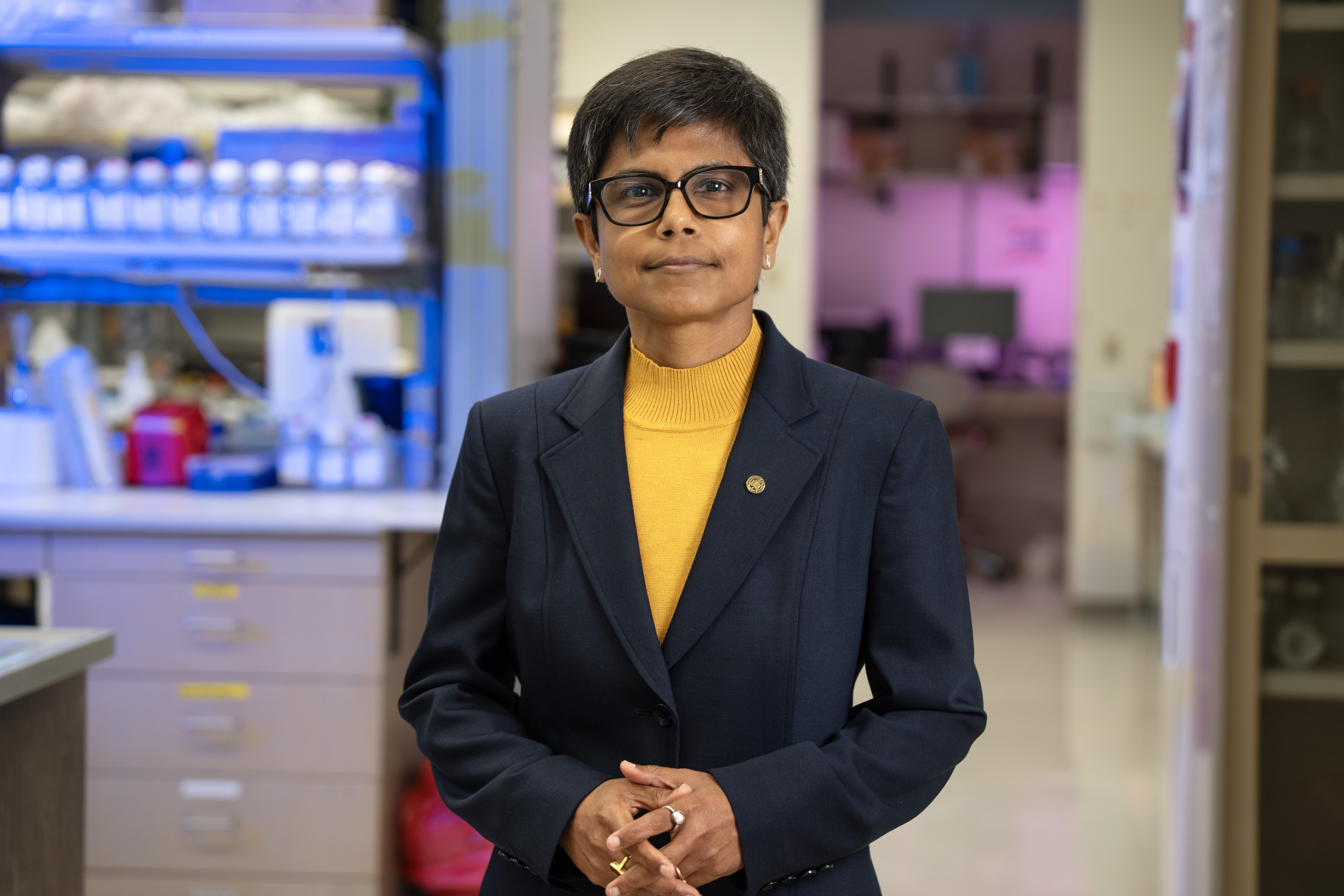Meet the Principal Investigator

Dr. Pradipta Ghosh is an Indian-born American physician-scientist, biochemist, and cell biologist with dual expertise in clinical medicine and basic research. As a Professor in the Departments of Medicine and Cellular & Molecular Medicine at the University of California, San Diego, she leads an innovative research group focused on cellular communication networks. Her work has made major strides in understanding how intracellular heterotrimeric G-proteins are regulated by a novel family of guanine-nucleotide exchange modulators (GEMs), independently of traditional G-protein-coupled receptors (GPCRs). This groundbreaking research has uncovered new mechanisms of cell signaling with implications for chronic diseases such as cancer, fibrosis, immunologic and metabolic disorders. Ghosh’s contributions have provided key insights into how intracellular communication is disrupted in disease—a conceptual breakthrough after prior attempts to unravel this network had failed.
Recognizing the need for innovative tools to probe the laws governing cellular function, Ghosh founded the Institute for Network Medicine in 2018. This institute houses four transdisciplinary centers that work synergistically to uncover the unifying principles of cellular behavior, a.k.a invariants: (i) The Center for PreCSN uses computational approaches to mathematically define these invariants; (ii) The HUMANOID™ Center models them using 3D cultures of human organoids and primary cells; (iii) The Agilent Center of Excellence employs advanced cell analysis techniques to measure these invariant features in cells; and (iv) The ConCISE applies systems engineering to build predictive virtual models to understand the emergent properties of these invariant cellular functions.
Through these efforts, Ghosh seeks to not just advance GEM biology, but also test their potential to improve rigor, reproducibility and precision medicine and reduce the translational gap in drug discovery. Her overarching vision is to harness the complexity of cellular networks to improve human health and engineer smarter systems, paving the way for transformative research and medical advancements.
Finally, as a physician-scientist, a founder of an Institute, a woman, a mother, and a mentor of a notable pedigree (she was mentored by exemplary mentors, Kornfeld and Farquhar), Ghosh is an ideal role model for young scientists.
Read more about Ghosh’s career path in this interview [Link].
- Watch Ghosh’s TEDx talk, 2019 on Decoding Cellular Intelligence [Link: https://www.ted.com/talks/pradipta_ghosh_decoding_cellular_intelligence]
- Watch Ghosh’s TEDx talk, 2024 on Tiny Tools, Tremendous Impact [Link: https://www.youtube.com/watch?v=bKJ-OYKTN9U]
About the Lab
The Ghosh lab strives to study the cell biology of signal transduction, with a focus on heterotrimeric G-proteins (trimeric-GTPases). These classes of G proteins have been found on a variety of intracellular membranes since the early 1990's; what they do there remained a mystery. We have systematically pursued in-depth the biological implications of this intracellular trimeric-GTPase system; it is modulated by a novel family of guanine-nucleotide exchange modulators (GEMs) and is fundamentally distinct from the conventional trimeric-GTPase signaling from the cell surface by G protein-coupled receptors (GPCRs).
We were one of the original discoverers of this signaling system beginning with the discovery of GIV-GEM, and subsequently extending to 3 other members (NUCB1/2 and Daple-GEMs). We showed that GEMs serve as vital platforms for intracellular communication networks; they coordinate cellular responses and organellar function in cells responding to environmental signals initiated by diverse classes of receptors, thereby allowing non-GPCRs to engage with and modulate trimeric-GTPases. Using the powerful synergy of cell, molecular and structural biology, molecular imaging, systems biology and bioinformatics, we showed the crucial importance of the GEM system in coordinating diverse cellular processes and revealed the mechanistic basis of their GEM action. As a physician-scientist, my group relentlessly pursued why/how aberrations in the GEM system spur pathogenic conditions such as cancer progression, fibrosis and insulin resistance, and provided the impetus to develop drugs targeting GEMs in these and other disease states.
Although modulation of trimeric-GTPases by GPCRs remains a core target of modern medicine, our discoveries have revealed that trimeric-GTPase signaling via GEMs is just as important, if not more, for coordinating cellular responses in physiology and for diagnosing and alleviating human suffering.
Learn More About the Lab
Contact Us
Pradipta Ghosh, M.D.
Professor
Departments of Medicine and Cellular and Molecular Medicine
Director, Institute for Network Medicine [iNetMed.ucsd.edu]
Executive Director, HUMANOID™ Center of Research Excellence (CoRE)
Lab Location
University of California San Diego
George Palade Laboratories for Cellular and Molecular Medicine (GPL Building)
Rooms 232 (office) & 239A-E (laboratory)
Mailing Address
University of California, San Diego
9500 Gilman Drive, Mail Code 0651
La Jolla, CA 92093-0651
Office Phone
858-822-7633
Lab Phone
858-822-7635
858-246-2216 (lab)
Fax
858-822-7636
